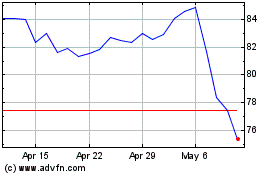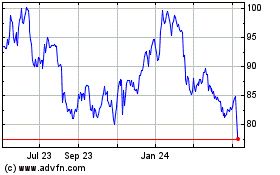Four Studios Won't Honor Movie-Booking Practice
May 26 2016 - 5:40PM
Dow Jones News
Four major Hollywood studios are telling theater owners they
will no longer participate in a movie-booking practice that has
attracted lawsuits and attention from the Justice Department,
according to people familiar with the matter.
For years, theater chains have made "clearance" requests to
studios, allowing some exhibitors to show certain movies in a
market exclusively. But even fans of the practice have wavered in
their support over the past two years, as smaller theater operators
say it squeezes them out of lucrative titles and lets larger chains
dominate the field.
In March, Twentieth Century Fox told exhibitors it would stop
honoring clearance requests altogether, starting with Friday's
release of "X-Men: Apocalypse." Viacom Inc.'s Paramount Pictures
has long been resistant to clearance requests, and over the past
several weeks, two other studios have joined them: Lions Gate
Entertainment Corp. and Comcast Corp.'s Universal Pictures.
That means a majority of major Hollywood studios have stopped
honoring clearance requests. The three studios that haven't
indicated any change in policy are Time Warner Inc.'s Warner Bros.,
Walt Disney Co. and Sony Corp.'s Sony Pictures Entertainment.
Studios have always had the power to deny clearance requests
from exhibitors, but at the risk that those theaters would then
refuse to show the movies in that market. Fox's move, however, met
little resistance from major exhibitors, who began booking "X-Men"
in competitive markets ahead of its release this weekend.
(21st Century Fox, which owns the studio, and News Corp, owner
of The Wall Street Journal, were until mid-2013 part of the same
company.)
The change in response could mean some theaters will be able to
show titles from the all-important summer movie season that would
have otherwise been off-limits. In conversations with exhibition
executives, studio distribution chiefs cautioned that the changes
in policy don't mean that any theater is guaranteed every movie it
wants to screen.
Some exhibition executives think the change in practices could
allow the clearance debate to end quietly if all major studios
agree to stop honoring the requests. "It's all about over, I
think," said one exhibition executive.
Others said that its effects could still play out in the courts
or through the Justice Department, which has been interviewing
executives about it for more than a year, according to people
familiar with the matter.
Last year, luxury exhibitor iPic Entertainment LLC filed suit
against AMC Entertainment Holdings Inc. and Regal Entertainment
Group, alleging that the nation's two-largest theater chains
exercised clearance requests to drive business from iPic.
A state court judge in Texas found last week that there is
enough evidence to warrant a trial, now scheduled for early
October. IPic Chief Executive Hamid Hashemi is pursuing punitive
damages for business he says was lost because of clearance
requests, so any change in studio policy in the meantime wouldn't
stop his suit from going to trial.
AMC and Regal declined to comment.
Write to Erich Schwartzel at erich.schwartzel@wsj.com
(END) Dow Jones Newswires
May 26, 2016 17:25 ET (21:25 GMT)
Copyright (c) 2016 Dow Jones & Company, Inc.
Sony (NYSE:SONY)
Historical Stock Chart
From Mar 2024 to Apr 2024

Sony (NYSE:SONY)
Historical Stock Chart
From Apr 2023 to Apr 2024
